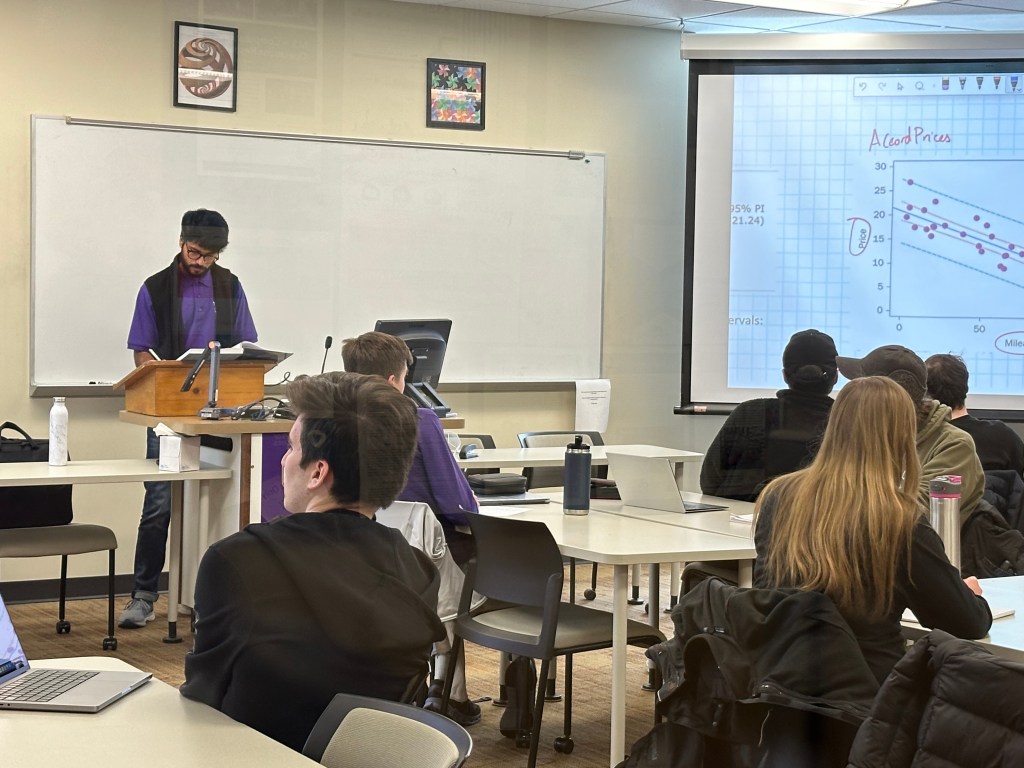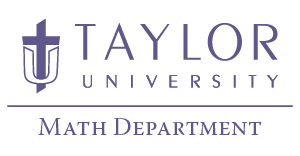Dr. Amish Mishra joined Taylor University in January 2024 and officially became a professor of mathematics. He is currently teaching Advanced Statistical Methods. Dr. Mishra graduated from Taylor University in 2019 and so we are excited about having him back.
We were honored to interview Dr. Mishra and ask him about his experience in data science and the new major in the Department of Mathematics at Taylor University – Data Science. Below is the transcript of this interview.

Q: We know that you graduated from Taylor University in 2019 and so we are curious about why you come back to serve at TU as a professor mainly teaching data science courses?
A:
Yes, I graduated from Taylor University and really enjoyed my experience here. I was both in the mathematics and computer science department for the majority of my courses. So my natural background was in doing both mathematics and computer science work. And that is what data science is: the intersection of math, statistics and computer science.
When I heard about the opportunity that Taylor had this position opened. I prayed about it and asked if this is God’s will for me to come back to Taylor. Is He opening a different door to me? It is easy to think we can go anywhere in the world when we are young since there are so many opportunities. But when God calls, we should not hesitate. I felt God calling me and really impressed in my heart that He will do great things at Taylor, so I decided not to let this opportunity go, but step into it. Even though I don’t know what the long-term future holds, I know that I would love to have the opportunity to develop the data science program at Taylor, and learn from such wise, Godly, and talented colleagues that I once even had as professors.
Also, I think training young Christian data scientists is such a great way to spread the Gospel into so many industries. Once you do data science, you may go to different industries with that kind of skill set. As I imagine all the places that young Christians might go to, where they will have conversations with non-believers and be able to share the Gospel, their faith, their journeys, and their testimonies, it just makes me super excited!
Q: How do you find data science fascinating?
A:
I went on to grad school to pursue my PhD in mathematics. But along the way I met an amazing advisor (Dr. Francis Motta) in Florida Atlantic University, who guided me to the area that he is interested in. He had vast interests in many different fields, and one of the fields is called topological data analysis. It is about analyzing data, but just for the structure, such as how data is connected and how we can use that information to inform models to influence decision making.
Dr. Motta introduced me to a project in topological data analysis. As the project went on and on, I realized that there are good applications for the work that I am doing with data science. This got me into learning about all the different ways, different tools, and different methods people are using in data science. So, I spent a lot of my dissertation work as well just studying machine learning methods and data science methods, implementing them, analyzing them, and eventually, it made me fascinated with a field of work that is very applicable. But these applications are not too far away from using some sophisticated mathematics and statistics.. For anyone interested in many different technical fields such as mathematics, statistics, computer science, and programming, and with a passion for technology, they will love data science. And I am one of these people.

Q: Why do we need to learn data science? And how did Taylor University start data science as a major two years ago?
A:
Now there is a big data boom in the world where companies are producing information and quantities that have not been seen before. So we have industries like sports industries, finance industries, health care industries, and any other types of industries you can think of that have large amounts of data. They have data that needs to be cleaned up and interpreted. Thus, they need people who can ask good questions about data. For example, what can I learn from this; how can we use this to improve our business; how can we use this to strengthen public health? Then, data science itself just becomes a field that can be plugged into anywhere. So, studying data science is very versatile and this is why it is important to push data science out as a study.
In Taylor University, we have always had courses that prepare students to go to data science. There is good evidence for this considering we have had several students in the past end up in data science and analytics careers in places like corporate Chick-fil-A and doing sports analytics. But we did not have an official program that is called data science. We recently realized that students want to enroll knowing that they are preparing for a career in data science. So, we crafted a rigorous data science degree program on the bedrock of our existing excellent courses along with a few additions to better prepare students. We currently have 20 students pursuing a major or a minor in data science and anticipate dozens more to join in the coming years!
Q: You have said “processing data with both our minds and our hearts, we are indeed rational and emotional beings playing as decision-makers with data.” What do you specifically mean by processing data with our hearts?
A:
I remember writing this in my biography on the Taylor page, sharing just my perspective on the field of data science. People have a temptation to think that data will naturally reveal an objective truth. But along the process, anybody who has done deep data analysis and statistical modeling will know that we make decisions. Answering questions such as what is important to include in the model, what is not, what can we do with the information we have, Which kind of data is important to what we are doing, and what tool I am going to use. So there is always decision making, and some decisions are not clear-cut rational.
Our world view, desires, integrity, the way our heart functions and what we think is crucial, all these things inform ethical and practical decisions when we deal with data. So I want to put that front in center, avoiding the naive mistake of thinking we are just using our minds when dealing with data. We are also using our hearts and desires as we make decisions. This is a portion that we don’t want to miss out on.
In short, data has a story to tell, and we are the storytellers; storytellers naturally tell us a story with their own hearts as well as their own minds. It is important for our Christian data scientists to carefully consider where our heart is and where our mind is set on while we work.

Q: As a new student in Taylor University and majoring in data science, I want to ask what do you think is the biggest highlight in this subject? What should we be careful of? And what study suggestions would you give to data science students?
A:
Echoing what I said earlier about data science being wide, it is a discipline needed in all fields that have large amounts of data. Since data can be applied to so many disciplines, like finance, health care, social media, sports, entertainment, engineering, and anywhere you want to go where there is a large amount of data, you can find a foothold using data science. You are able to study data science by not sacrificing your love for a specific domain. Sometimes people will think that if I am going to study data science, then I have to give up sports I enjoy, other entertainments or fields I am interested in to study math and computer science. But the reality is that every data scientist must choose one or more fields to apply the skills they have learned in their courses. So, students need to be interested in an area of application for data science.
For me, personally, that is education. I am an educator. I am a professor, teaching data science. But for you, that might be sports analytics , that might be working with a hospital, that could be working with a tech company like Spotify or Netflix or some other companies that generate vast amounts of data. If you have a huge interest in a field like that, then take your data science skills and projects prepared, and market yourself as somebody who doesn’t just know math and computer science but also has an interest and understanding in the domain you want to work in.
Finally, I would just caution students by reminding them of what Paul reminds us of in Colossians 3, where he said to set your hearts and your minds on things above where Christ is; and do not set your hearts and minds on earthly things like data and jobs. Our hearts and minds are really fixed on Christ. Once our hearts and minds are fixed on the things that are eternal, the things on the earth that we are working with will come into perspective.

